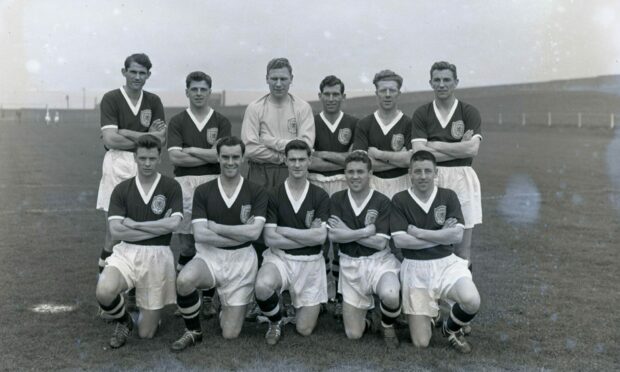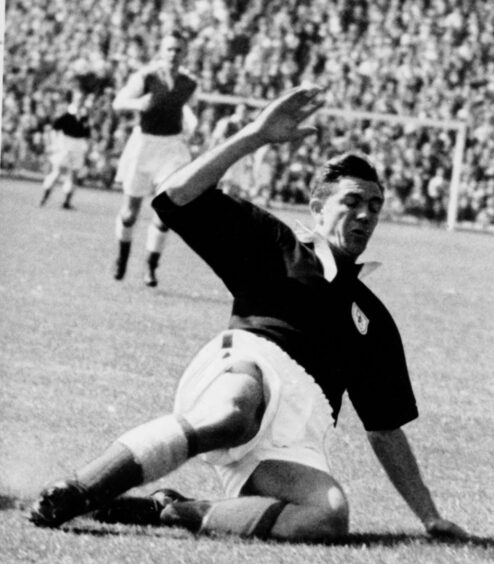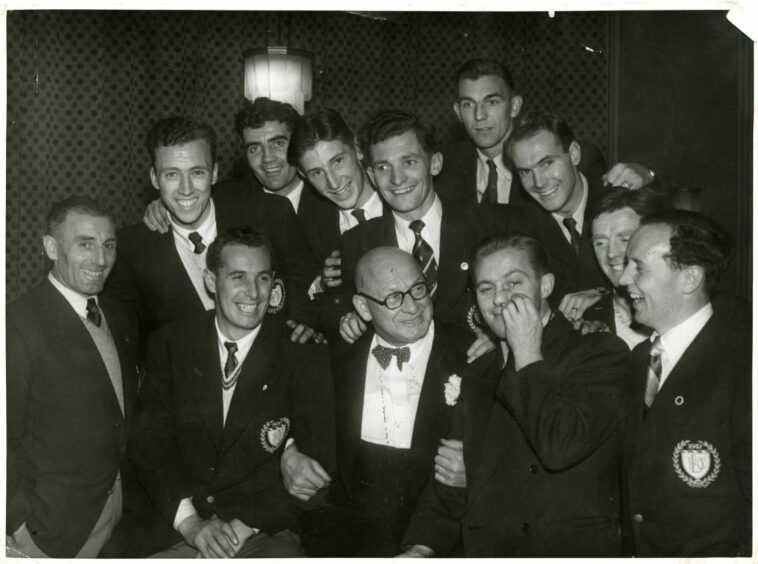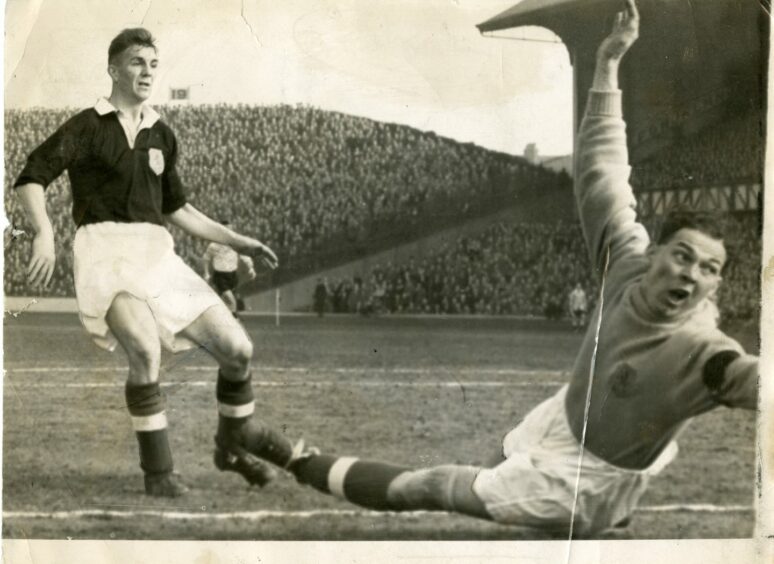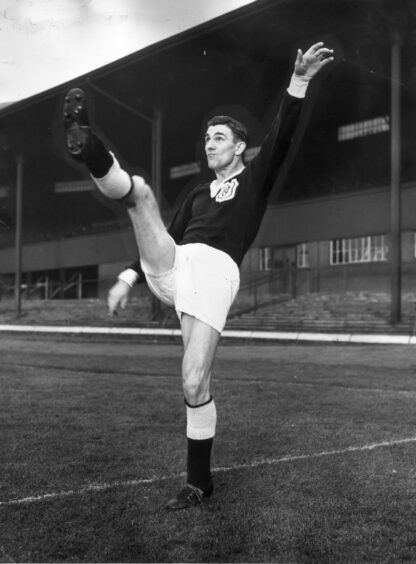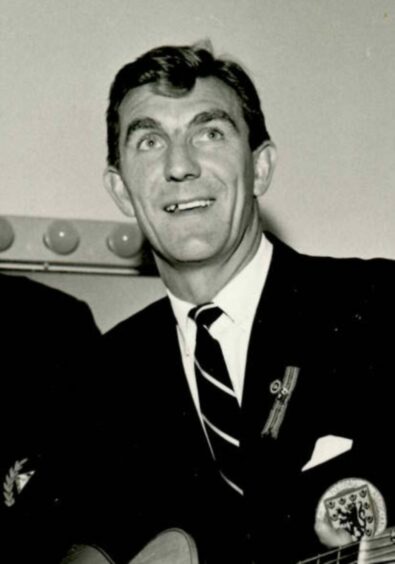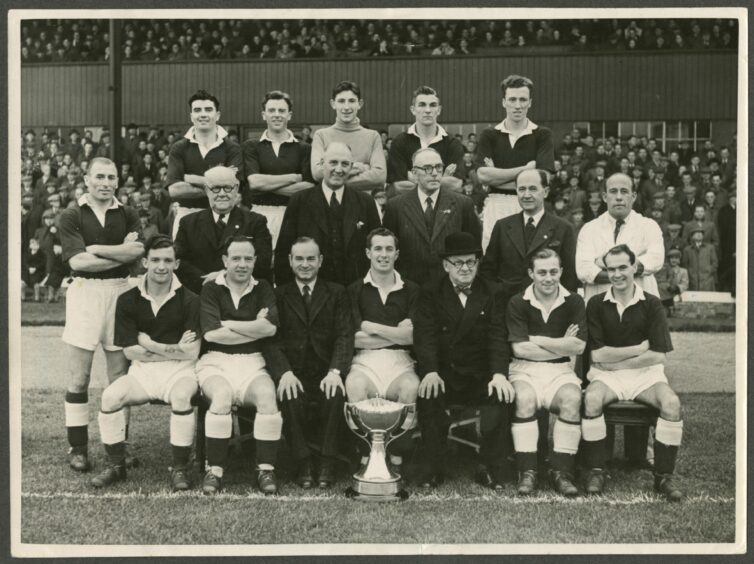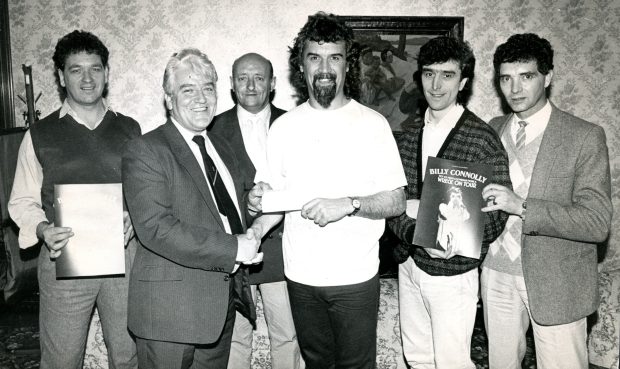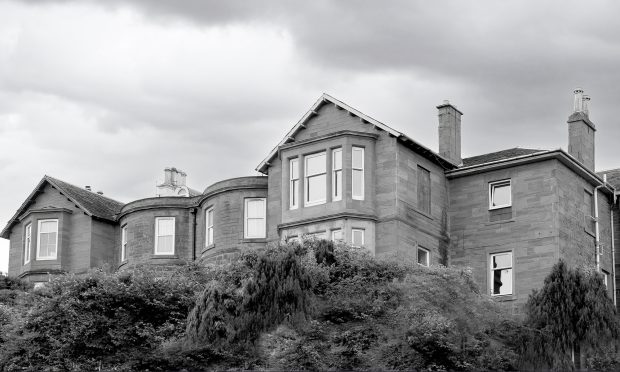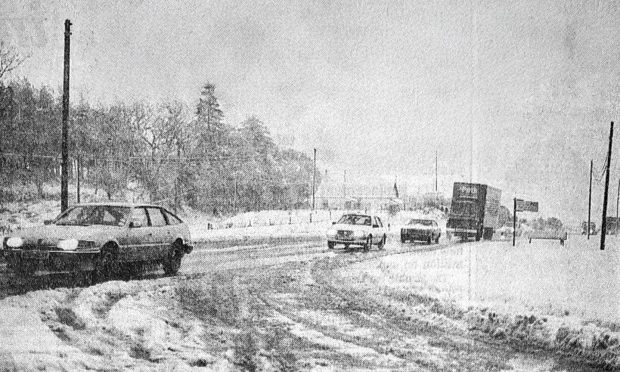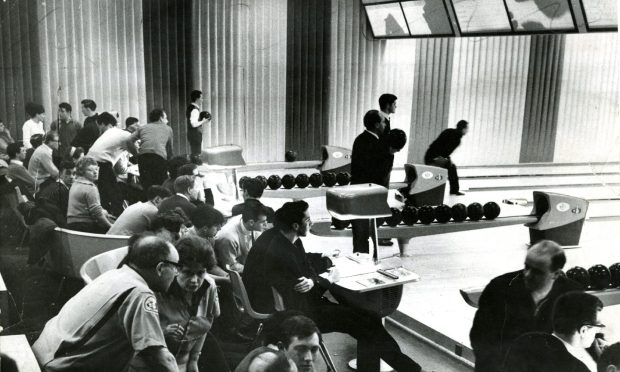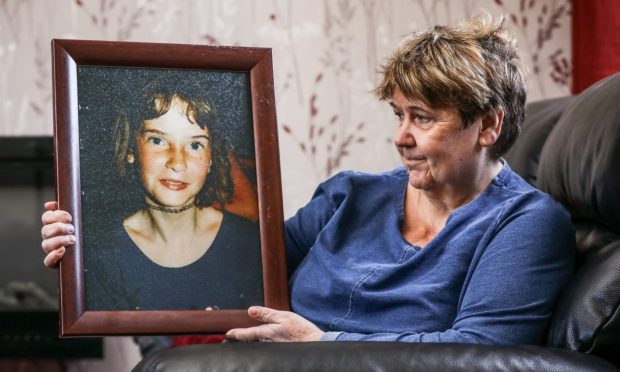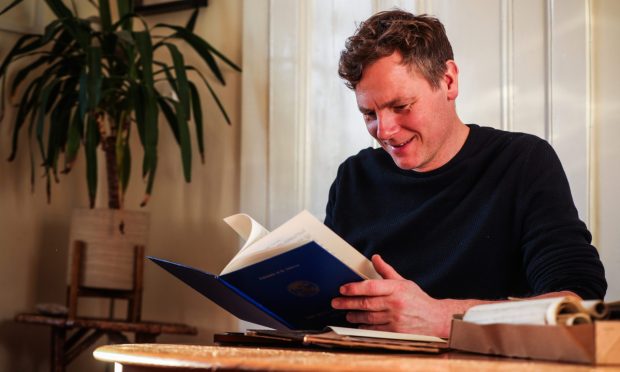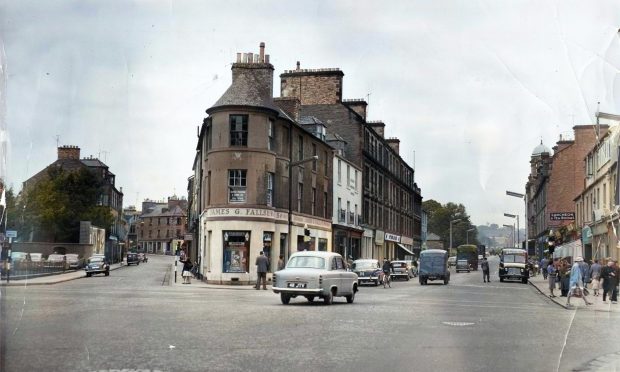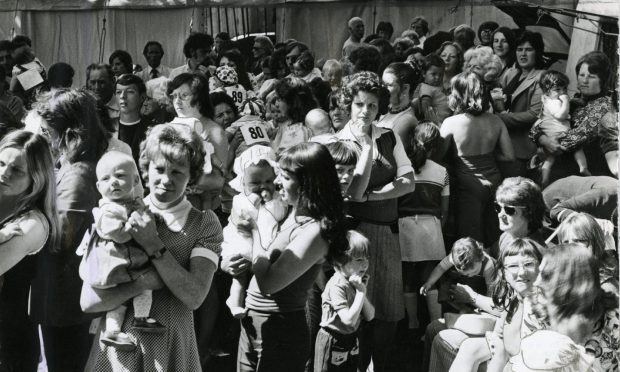They were the trailblazers who went into World Cup action for Scotland in 1954.
But now, with the death of Dundee FC stalwart Doug Cowie at 95, the last post has been sounded on those who took part in the global event for the first time.
Cowie, a classy performer with silk and steel in his armoury, might have been born in Aberdeen and was an apprentice riveter at the John Lewis shipyard in the Granite City, but once he had pledged his allegiance to Tayside in 1945, he was a stalwart for both club and country during a distinguished career.
It wasn’t his fault that the preparations both before and during the World Cup in Switzerland were so shambolic.
But, almost as if providing a template for repeated buffoonery from the blazers in the tournament as the century passed, the SFA seemed more interested in their committee members and their wives than the players who were stepping into the unknown.
It culminated in embarrassment and an almighty thrashing – and a frazzled Scottish coach quitting his role midway through the competition.
But none of this was down to such redoubtable performers as Cowie, Tommy Docherty, Willie Ormond and Hill of Beath-born captain Willie Cunningham.
By the time that he made his Scotland debut in 1953, Cowie had already been an influential member of the Dundee side which won back-to-back League Cups in 1951 and 1952, in addition to being a member of the Dens Park squad which narrowly missed out on winning the league by one point in the 1948-49 season.
Nobody remotely doubted his credentials.
Yet, if the SFA had any ambitions for their representatives, they kept them well concealed. Having turned down the opportunity to take part in the 1950 World Cup – which still seems inexplicable more than 70 years later – they could hardly have been more disdainful in their approach to the event.
Nor were they helped by being unable to pick any Rangers players, because the Ibrox club was on a pre-season tour of North America.
It was an exercise in ineptitude
Docherty recalled: “We only took a squad of 13 players – and two of them were goalkeepers. I don’t know what would have happened if we’d had any injuries.
“You were allowed to take a squad of 18, but we only took 13. The rest of the plane was filled with Scottish FA committee members and their wives.
“It said it all about their priorities, to be honest.”
That wasn’t the only problem.
Having apparently watched too many videos of Alpine skiing, the Park Gardens executive clearly thought Switzerland was like Ice Station Zebra and kitted their men out in heavy cotton shirts and shorts.
But it was warm inside the Hardturm Stadion in Zurich on June 16 as Cunningham’s team made history in front of a crowd of nearly 25,000 fans.
Even during the build-up, there was a stark contrast between the sides.
The Austrians stood in excited anticipation kicking their boots out in anticipation and were clearly pumped with lashings of nervous energy. They handed over a pennant to their opponents who hadn’t been given one by the SFA.
The Scots, meanwhile, looked nervous and Cunningham stood with his arms folded, almost if he was fearing the worst. Cowie had a steely glint in his eye, Docherty gazed at his rivals and thought they looked like muscular models, and although the debutants fought hard, they struggled in the conditions with their hard old boots (from the 1930s) restricting their pace.
This match could have gone either way – Erich Probst scored the only goal in the 33rd minute – and the Scots created several chances of their own.
But the defeat had swift repercussions. Andy Beattie, who had been appointed just a few months earlier, felt he had no other option but to resign after the game and blamed a combination of shoddy organisation, limited selection options and poor financial rewards for the players at his disposal.
This left the SFA committee and a physio in charge of team affairs for the contest against reigning world champions Uruguay just three days later.
As Cunningham remarked later, they could have fielded all 13 players in that tie and it wouldn’t have saved them from an excruciating battering in Basel.
The heat was on the beleaguered bunch even before the tussle commenced. Docherty reckoned he lost half a stone during the anthems. Ormond added that the lack of substitutes meant there was added pressure on the Scots.
But the South Americans were formidable and they soon turned the screw. Carlos Borges opened the scoring in the 17th minute – on his way to a hat-trick – and Omar Oscar Miguez doubled their advantage after half an hour.
By the interval, urgent showers and fluid intake were required. As D0cherty said: “The heat was incredible and we were drenched in sweat. At the interval, we had to get in to a lukewarm bath to cool down. We just weren’t prepared.
“We weren’t given a run down on who were their dangerous players or anything like that. Although I was told to man-mark their star player, Juan Alberto Schiaffino. No-one told me how good he was, I couldn’t get near him.”
Nor could anybody else as Uruguay added five second-half goals and the rout finished with the Scots utterly dead on their feet.
Cowie was in reflective mood when he spoke to The Courier after the squad returned home, but it was pretty obvious he thought Beattie had been badly treated by the SFA.
He said: “For the first 25 minutes, Uruguay were just another team and we began with some confidence after the Austria game, but the longer it went on, the harder it was and we couldn’t have carried on without a cold shower.
“Two quick goals after half-time finished it and, from that point, the champions were just playing with us. They were completely in charge.”
What should Scotland do in future?
Asked about the lessons the SFA should learn, Cowie added: “They’ll have to start coaching the children earlier in the schools and catch them young.
“Mr Beattie had the right ideas and helped the team a lot. We respected what he was trying to achieve. We were all very sorry when we heard that he had decided to give up the job. It definitely didn’t help.”
Docherty was more direct when asked if, having played in an FA Cup Final (for Preston North End who lost 3-2 to West Brom), captained his country and played in a World Cup in the same year, he felt as if his ship had come in.
“Aye,” replied The Doc. “It’s just my luck I was at the airport.”
On his final visit to Dens to reopen the Doug Cowie Lounge in 2014, the modest hero took the opportunity to look round the stadium which he described as “beautiful” in the foreword he had written for the Dundee Hampden Heroes book the previous year.
A club representative said: “As he cut the ribbon, he simply stated that he wished that he could still have put his boots on for it for League Cup match that was about to take place and there was not a single Dee who would disagree with that statement.”
Even if he never won a match during his brace of World Cups – the Scots managed a 1-1 draw with Yugoslavia (and a 3-2 loss to Paraguay in his last international appearance) in Sweden in 1958 – Tayside can be truly proud of one of the great figures in his country’s football history.
Indeed, he also worked as coach with Jerry Kerr at Dundee United after his playing days were over and several Tannadice stars spoke warmly about how he had assisted them on the training pitch during that period.
In his book Dundee Greats, author Jim Hendry described Cowie as a player with ‘the touch of an angel’ and he was deservedly inducted into the inaugural Dundee FC Hall of Fame in 2009.
The word “legend” is often overused in the sporting world.
But it’s emphatically merited in Doug Cowie’s case.
More like this:
Ian Redford: How a future Dundee United star and former Dens hero rained on Jim McLean’s parade
Relegation and redemption: Aberdeen great Martin Buchan recalls turbulent years at Manchester United
